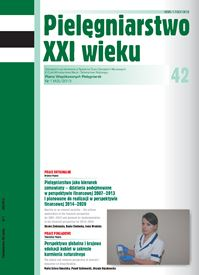The role of a midwife in the contact with parents of a newborn who is staying in the Neonatal Intensive Care Unit
Keywords:
interpersonal communication, emotional support, parents’ attitudes towards sick children staying in NICU ward, a premature childAbstract
THE ROLE OF A MIDWIFE IN THE CONTACT WITH PARENTS OF A NEWBORN WHO IS STAYING IN THE NEONATAL INTENSIVE CARE UNIT
Introduction. In the process of forming human relations, the most significant role is interpersonal communication. The art of communication, which is one of the most important skills, is indispensable in this work. During the everyday contact with parents, the midwife gives important information about the child’s condition. She also tries to console the child’s family in difficult and hard situations. It is very important to carry on the conversation properly, in a partnership way. Parents should know that they can talk about their fears and problems openly.
Aim. The aim of the work is showing the role of midwife during the process of communication with the family of a child who is staying in NICU ward.
Material and methods. The material for prospective research were data acquired from thirty-eight midwives who were working in the OITN ward and thirty-nine infants’ parents who were staying in the OITN ward. The entire research was conducted between August and October 2009 year. In the work a method a diagnostic survey was employed based on author’s questionnaire. All of the gathered material was subjected to statistical analysis based on the Statistica program.
Results and conclusions. In the first researched group midwifes between 41-50 years old predominated with work experience of about 21-30 years. In the second group there were mid wifes between 32.4±5.7 years old. Parents express a wish that a midwife should be benevolent, caring, emphatic, and should know how to display apprehension. Frequently asked ques tions were: condition of child, body weight, eating willingly. Both par ents and midwifes reach an agreement without any objections.
References
1. Nyklewicz W. Podstawy teoretyczne procesu komunikowania. [w:] Kwiatkowska A, Krajewska- Kułak E, Panek W, red. Komunikowanie interpersonalne w pielęgniarstwie. Lublin: Wyd. Czelej; 2003: 29, 50-51, 36-37.
2. Nęcki Z. Komunikacja międzyludzka. Kraków: Wyd. Profesjonalnej Szkoły Biznesu; 1996:109.
3. Cooper PJ. Sprawne porozumiewanie się. Warszawa: Wyd. Centralny Ośrodek Doskonalenia Nauczycieli; 1994: 1.
4. Sikorski C. Zachowania ludzi w organizacji. Warszawa: PWN; 2002: 196.
5. Wolska-Lipiec K. Komunikowanie w pielęgnowaniu, [w:] Kwiatkowska A, Krajewska- Kułak E, Panek W, red. Komunikowanie interpersonalne w pielęgniarstwie. Lublin: Wyd. Czelej; 2003: 88-89.
6. Fallow. eld L., Jenkins V. Communicating sad, bad, and difficult news in medicine, Lancet 2004, 363: 312-9.
7. Kawczyńska- Butrym Z. Rodzina – zdrowie - choroba. Lublin: Wyd. Czelej; 2001:27, 79.
8. Kmita G. Rodzice i ich przedwcześnie urodzone dziecko, [w:] Helwich E, red. Wcześniak. Warszawa: Wyd. Lekarskie PZWL; 2002:123, 116, 113, 122.
9. Kmita G. Wybrane metody wspierania wczesnych kontaktów pomiędzy rodzicami
a hospitalizowanym noworodkiem. Medycyna Wieku Rozwojowego; 2000; (supl. 4):413-422.
10. Urbaniak K. Matki na oddziale patologii noworodka. Dziecko potrzebuje miłości. Magazyn pielęgniarki i położnej; 2005; 12.
11. Bednarek A, Mianowana V, Jachorek M. Zakres funkcji profilaktycznej i promocji zdrowia w pracy pielęgniarki pediatrycznej a oczekiwania rodziców hospitalizowanych noworodków. Problemy Pielęgniarstwa; 2011; 19 (3): 296-302.
12. Bilicka D., Korbińska M., Popow A., Szewczyk M. T. Oczekiwania rodziców względem opieki pielęgniarskiej nad dzieckiem w warunkach szpitalnych. Pielęgniarstwo Chirurgiczne; 2009; 1:20-25.
13. Zarzycka D. Model teoretyczny pielęgniarstwa Florence Nightingale, [w:] Ślusarska B, Zarzycka D, Zahradniczek K, red. Podstawy pielęgniarstwa. Lublin: Wyd. Czelej; 2004:123.
14. Glińska J, Bera A, Brosowska B i wsp. Analiza przyczyn hospitalizacji oraz wyników leczenia noworodków na oddziale patologii i intensywnej terapii noworodka. Rola pielęgniarki neonatologicznej. Problemy Pielęgniarstwa; 2011;19 (4):431-438.
15. Motyka M. Rola aktywnego słuchania w komunikacji terapeutycznej z pacjentem. Problemy Pielęgniarstwa; 2011;19 (2):259-265.
16. http://www.termedia.pl/showpdf.phparticle. 2010.01.05
17. Kmita G. Rodzice i ich przedwcześnie urodzone dziecko, [w:] Helwich E, red. Wcześniak. Warszawa: Wyd. Lekarskie PZWL; 2002, s.123, 116, 113, 122.
18. Bednarek A., Mianowana V., Jachorek M. Oczekiwania rodziców hospitalizowanych noworodków w zakresie realizowanej opieki. Problemy Pielęgniarstwa; 2011; 19 (1):27-33.
19. Marć M. Gromadzenie informacji o pacjencie i jego rodzinie. Podstawy pielęgniarstwa. Tom I. Lublin: Wyd. Czelej; 2004:222-235.
20. http://www.zdrowiepubliczne.pl/artykul/. 2010.01.05
21. Fisher M. Identified needs of parents in pediatric intensive care unit. Crit Care Nurse. 1994, 14: 82-90.
Downloads
Published
Issue
Section
License
Copyright (c) 2013 Elżbieta Porada, Renata Raś, Dominika Pasierb, Jolanta Wała (Autor)

This work is licensed under a Creative Commons Attribution 4.0 International License.




